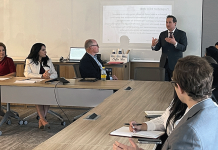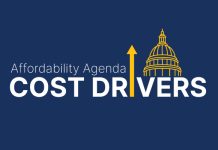 The Legislature fulfilled its constitutional obligation this week by approving a state budget just ahead of the June 15 deadline. But meeting the formal requirement is merely an intermediate step in negotiations to finalize the comprehensive state spending authority.
The Legislature fulfilled its constitutional obligation this week by approving a state budget just ahead of the June 15 deadline. But meeting the formal requirement is merely an intermediate step in negotiations to finalize the comprehensive state spending authority.
The biggest obstacle to a final agreement is the haggling required to satisfy political and policy demands in the face of an unprecedented windfall of tax revenues and federal largesse. The massive wave of expectations upon learning of a $40 billion revenue windfall (compared to the January budget proposal) has created strong differences of opinion between the Administration and Legislature, not just which new or expanded programs should receive funding, but even on how much new revenue is available to spend in the first place.
Presumably, the major issues will be hammered out before the new fiscal year commences on July 1, although it’s a near certainty that selected budget-related issues will drag on through the end of the legislative session in September, and perhaps beyond that.
In the meantime, the CalChamber has weighed in on four key state spending issues that should be addressed by the Legislature:
Unemployment Insurance (UI) Debt
The pandemic created an unprecedented spike in unemployment, which was a human tragedy, but also drained the state’s UI fund, which is funded entirely by employers. Earlier this year, California began borrowing money from the federal government to pay benefits to over a million workers in California. The loan balance from the federal government is $21 billion and is expected to grow to $24 billion by the end of this year. Unless the State intervenes and pays off this outstanding debt, employers must pay off this loan through ongoing and escalating tax increases for decades to come.
The Governor has proposed a $1.1 billion contribution toward the outstanding debt; much more is needed to avoid long-term payroll tax increases on employers that could increase ten-fold over time. Democrats in the Legislature are considering a different approach that does not address future long-term tax liabilities for employers. Instead, they have floated a 10-year, $2 billion total tax credit aimed at small businesses and nonprofits.
Child Care
Investments in California’s child care system not only benefit working parents and children, but also the overall economy, since many businesses have been unable to operate at full strength with one or both parents necessarily involved in child care. The CalChamber supports a comprehensive budget augmentation to:
- Increases child care slots by 200,000.
- Provides for ongoing vouchers for essential workers.
- Caps family fees for child care programs at seven percent of income and increases family eligibility to the state’s median income.
- Increases reimbursement rates for child care and development programs.
- Provides one-time allocation of infrastructure grants.
- Provides one-time allocation of funds to expand facilities in high-need communities.
Consensus on this package appears strong, although it remains one of the elements of final negotiations, along with the Governor’s proposal to phase in an expansion of transitional kindergarten through 2025-26. All told, the package tops $10 billion in mostly one-time money, much of that from federal funds appropriated to address the pandemic.
Tax Credits and Incentives
Just one long year ago, when California’s political leadership believed the state was heading into a fiscal free-fall, the Legislature and governor agreed to suspend business use of net operating losses and cap the use of certain tax credits for three years, estimated to save more than $8 billion during that time. What may have seemed a prudent approach in 2020 is obviously completely unnecessary—and even harmful—given the unprecedented tax windfalls. Indeed, a CalChamber-sponsored study by the Milken Institute found that research and development policy requires a long-term outlook. Companies favor a more predictable policy environment; limitations on the R&D tax credit in 2020 were approved during a period of significant uncertainty, and the changes themselves created even more uncertainty.
The Legislature and Governor should repeal the suspensions and limitations on tax incentives and tools enacted in 2020, to enable a robust economic recovery, especially among the most dynamic sectors of our economy.
Broadband Infrastructure
If it was not obvious before, the pandemic underscored Californians’ reliance on the internet for distance education, telemedicine, staying connected with family and friends, and accessing jobs, goods and services. What also became painfully obvious was how a lack of connectivity can increase existing economic and social disparities. Broadband deployment is essential for all local communities, businesses, and their employees. This is especially true for California’s dynamic and diverse small business community.
The CalChamber supports the $7 billion investment proposed by the Governor to expand broadband infrastructure over the next three years, increase affordability, and enhance access for all Californians. However, this substantial commitment falls short of addressing the digital divide because it focuses resources on “middle mile” projects instead of directing resources precisely where they are needed most; that is, unserved and underserved areas—so-called “last mile” infrastructure. California should prioritize services to people who have the least connectivity rather than overbuilding digital infrastructure in areas where the market is working.
Loren Kaye is president of the California Foundation for Commerce and Education, a think tank affiliated with the California Chamber of Commerce.


